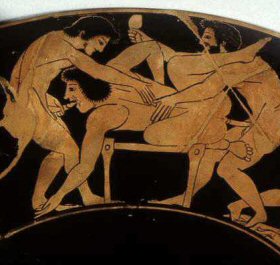 Penn State researchers have used fruit flies (an animal model frequently used to mimic human physiological responses) to reveal, for the first time, a basis for the effect of alcohol on male sexual behavior, including increased sexual arousal and decreased sexual inhibition.
Penn State researchers have used fruit flies (an animal model frequently used to mimic human physiological responses) to reveal, for the first time, a basis for the effect of alcohol on male sexual behavior, including increased sexual arousal and decreased sexual inhibition. Importantly, in contrast to previous studies, which subjected fruit flies to short-term doses of alcohol, researcher Kyung-An Han's team administered a daily dose of ethanol to more closely mimic the drinking habits of alcoholics and chronic alcohol abusers. Appearing in the journal PLoS ONE, the study made several novel findings with broad importance for further addiction research.
The team found that male fruit flies, which typically court females, also actively court males when they are given a daily dose of ethanol. "We identified three molecules that are crucial for "ethanol-induced courtship disinhibition," Han said. In one of the team's experiments, Han and her students generated transgenic flies whose brain activities regulated by the neurotransmitter dopamine could be turned off temporarily by changing the temperature to 32-degrees C. "Without a temperature change, the transgenic males showed conspicuous inter-male courtship under the influence of ethanol; however, they exhibited negligible inter-male courtship when we changed the temperature to block the transmission of dopamine neurons in the brain," Han said. "This result suggests that dopamine is a key mediator of ethanol-induced inter-male courtship."
A second discovery is that repeated exposure to ethanol causes male flies to engage in more inter-male courtship, a phenomenon known as "behavioral sensitization". "If a behavior like alcohol consumption becomes more pleasurable the more often you do it, you are more likely to keep doing it," Han explained. "This part of our study demonstrates that sexual behavior is not determined only during an organism's development, but it also can be influenced by a post-developmental environmental factor; in this case, recurring exposure to ethanol," Han said. "These findings represent the first demonstration of enduring behavioral changes induced by recurring ethanol exposure in a fly model."
Taken together, the findings described by Han's team provide novel insights into the physiological effects of chronic alcohol use on sexual behavior and adaptive physiological changes within the brain. "As a result of our research with the fruit fly, we are now just beginning to discover the molecular and cellular mechanisms underlying neural changes in the brain that result from the chronic use of alcohol and that result in alcohol addiction and other behavior changes in our fly model," Han concluded.
Related:
Gay Gene Row Reignited
Sexuality Not So Clear-Cut For New York Men
Source: Penn State University





